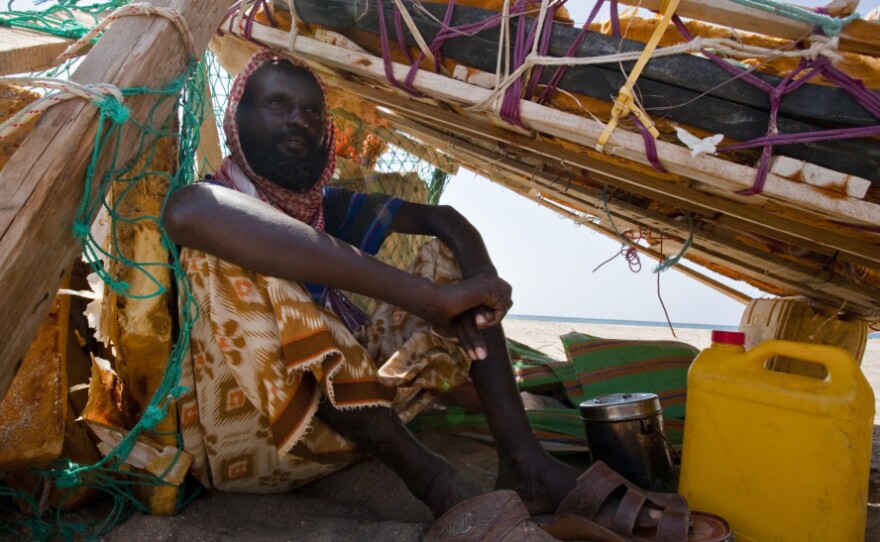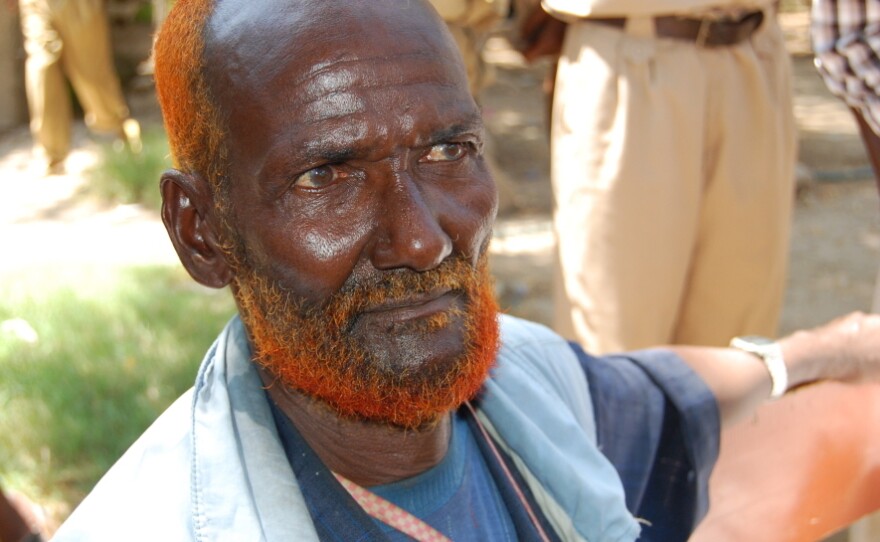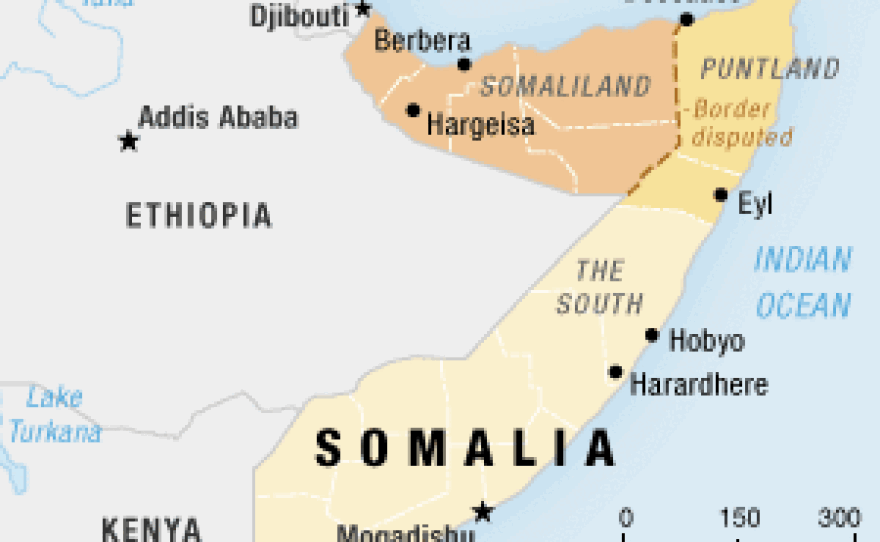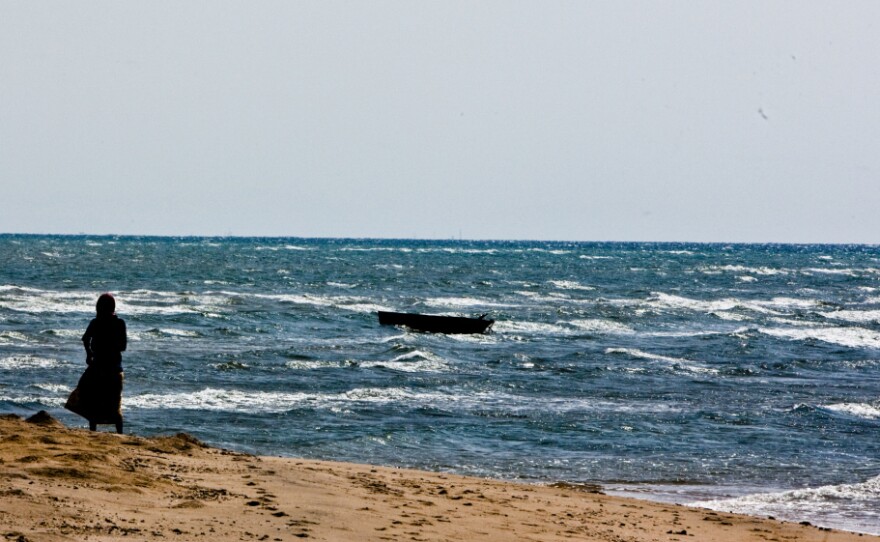The second in a three-part series.
Somalia is among the world's most lawless countries. That's one reason piracy thrives there. After hijacking ships, pirates return to shore, where government turns a blind eye — or may not even exist.
But one part of Somalia — a self-ruling region called Somaliland — is slowly trying to build the rule of law and a sense of civic duty. The result: Ordinary citizens occasionally catch pirates and turn them in. It's an informal, coastal neighborhood watch.

Suleman Ahmen Aden fishes along the windswept beaches of the Gulf of Aden, one of the world's most dangerous stretches of water. Just last Friday, a pair of pirate skiffs tried to overtake a chemical tanker, according to the International Maritime Bureau. The week before, another skiff fired on another tanker.
Aden fishes from a raft made of wood and Styrofoam lashed together with rope and wire. From a distance, it looks like a pile of garbage. But when the winds subside, he pushes his raft into the waves and paddles out more than a mile. Aden says he rarely sees pirates this close to shore.
"We saw some once, a year ago," says Aden, who has a long black beard and wears a red-checked scarf on his head. "Their boat engines were stuck. So, they had to beach here."
Aden said the pirates were armed with rocket-propelled grenade launchers and AK-47s. Despite their fearsome reputation, Aden says he wasn't afraid of the pirates.
"They were so tired and exhausted," he recalls. "They had been in the sea a long time, floating and sailing without food. They were hungry."
Aden offered them tea. Then, he called the coast guard.

"We pretended we were welcoming them," he says. "That's how we arrested them."
'We Even Fought Them'
Pirates, though, are not always so easy to subdue.
Omer Ahmed is a clan leader in Karin, another town down the coast. He says last year villagers captured more than a dozen suspected pirates. One citizens' arrest came after a tip that a suspicious boat was heading their way. Ahmed says residents fanned out to look for the vessel.
"The pirates came off the boats onto the beach, and went into hiding," says Ahmed, who has dyed his beard and hair with red henna, a Somali tradition. "We chased them. We even fought them, but were able to overpower them."
Ahmed said villagers traded a few gunshots with the men, who then surrendered.
A Fledgling Democracy
When people think of Somalia, they imagine Mad Max on the Horn of Africa, but the country is more complex.

Somalia is actually divided into three very different parts. To the south is Mogadishu, an urban warzone. To the northeast is Puntland, a semi-autonomous region and hotbed of piracy. And to the west is Somaliland, a fledgling democracy that sees itself as an independent country — though no one else does.
Scholars give Somaliland high marks for fighting piracy. Stig J.Hansen, who teaches international relations at the Norwegian University of Life Sciences, says Somalilanders have a national identity and a sense of duty that inspires them to crack down on pirates.
"The local population believes in the concept of Somaliland," says Hansen, who has studied Somali piracy since 2005. "That means it's very hard for the pirates to operate in Somaliland."
Hansen says Somalilanders also arrest pirates because they want to impress the outside world in hopes of gaining diplomatic recognition. But he says sometimes citizens go too far and arrest innocent fishermen from Puntland, a neighboring pirate hot spot.
"They are stereotyping," Hansen says. "They are claiming all these [people] are pirates, but there are innocent people there."
'I'll Never Be One'
Life is harsh along the Gulf of Aden. Ali Samater Abdi herds camels in the dunes near the beach. Three years ago, he had more than 100 camels, but drought killed most of them, leaving just 15. So, Abdi has turned to fishing.
"I have no equipment to fish or boats, nothing," says Abdi, who wears a torn white T-shirt and matching Somali sarong. "When I cast my net in the sea, I just sit on the piece of wood and paddle and catch as many fish as I can."
Some days Abdi catches two fish; other days, four. He keeps a couple for his family to eat. Then he walks three hours in rubber sandals to the market in Berbera, a port city, where he trades them for vegetables.
The quickest way for Abdi to turn his life around would be piracy. One good hijacking can pay a pirate $35,000 to $50,000 — a fortune in this part of the world. Has Abdi ever considered it?
His answer is swift and direct. "Pirates are bad," he says. "It's an issue that is bad for the country and for the world. As a result, I'll never be one."
Of course, not everyone in Somalia feels that way. Year after year, month after month, piracy continues to grow. Last week, pirates seized a German-owned cargo ship with 10 crew members. It was the 15th hijacking so far this year.
Copyright 2022 NPR. To see more, visit https://www.npr.org. 9(MDAzMjM2NDYzMDEyMzc1Njk5NjAxNzY3OQ001))







